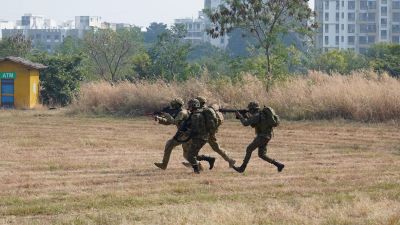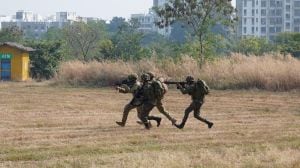Taekwondo: a war-torn nations pet sport,Olympic pride
Nikpai,who won his countrys first-ever Olympic medal at the Beijing Games a bronze in the 58-kg category,repeated the feat with a bronze in the 68-kg category in London.
When Rohullah Nikpai,Afghanistans only Olympic medallist,was given a heros welcome at the Kabul airport earlier this week,it was not only an indication of swelling national pride but also pointed to the passion for taekwondo in the war-ravaged country.
Nikpai,who won his countrys first-ever Olympic medal at the Beijing Games a bronze in the 58-kg category,repeated the feat with a bronze in the 68-kg category in London.
Fighting great odds,the 25-year-old has acted as a catalyst in increasing the popularity of taekwondo,which is now competing with buzkashi (sheep rugby),the national sport played on horseback,football and cricket in Afghanistan.
Four years back,we had about 1,500 registered practitioners of taekwondo. Now,there are over 2,000,including women. In terms of numbers this may not look like a huge jump,but in a country like Afghanistan,where infrastructure is minimal or being re-built,this can be considered as a 10-fold jump. Nikpais bronze at the Beijing Games made taekwondo the unofficial national sport of the country. His medal at London will surely see further increase in interest in taekwondo, Afghanistan National Taekwondo Association (ANTA) founder and president Hed Mohammad Shirzai told The Sunday Express from Kabul.
While the roots of taekwondo in Afghanistan can be traced back to 1973 when an African-American professor,Philip Cunningham,who taught at the University of Kabul,introduced the sport to students,Nikpai,a Hazara,was exposed to the sport at the age of 10,at a refugee camp in Iran. When he was two years old,his family crossed the border to escape persecution by the Taliban.
Nikpai trains at Munir Ahmed Taekwondo Association Club in Kabul,which is essentially a makeshift centre where the practice area is one-fifth the size of an Olympic taekwondo mat. However,the minimal facilities at taekwondo centres across the country havent stopped youngsters from taking up the martial art.
Over the past two years we have started training girls in taekwondo. Today we have 60 registered female practitioners of taekwondo. At the Taekwondo World Cup in Bulgaria next year,we will be sending our first women taekwondo squad to an international meet, Shirzai said.
The ANTA operates about 32 taekwondo centres that charge $4 per month as fees. There are about 500 taekwondo clubs across the country in all.
Many like Nikpai were introduced to the sport in refugee camps,and when they returned to Afghanistan they continued to practice taekwondo, said Shirzai.
When the Taliban were in power,the popularity of the sport remained intact,albeit to a much lesser extent. The Taliban regime did not officially ban taekwondo,so those who wanted to train could do so discreetly, said Shirzai.
On arrival in Kabul,Nikpai,who was coached by South Korean Min Sin Hak,hoped that his second Olympic medal would help unite the country. I wanted to win a gold this time and I worked hard for it but I am happy that I made everyone proud by winning the second medal. I hope my achievement in sport will bridge divides, he said.





- 01
- 02
- 03
- 04
- 05


























